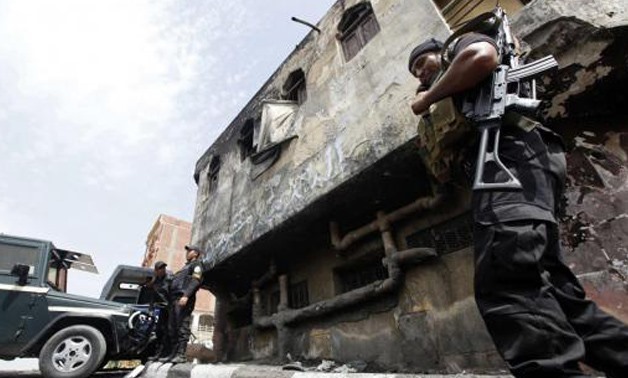
Police Officers Stand In Front Of Kerdasa Police Station after being Damaged - File Photo
CAIRO – 09 July 2017: The National Council for Human Rights (NCHR) affirmed that the death sentence against 20 convicts at Kerdasa massacre case was fair, and convicts were served all conditions of fair trial, according to statement released on Sunday.
The incidents date back to 2013, following the dispersal of Rabaa and Nahda sit-ins, where 14 police officers were brutally killed.
“The council has closely followed the procedures of the trial, as part of fact-checking committees that were formed following the massacres, where our agents met with families of victims and survivals of the incident, met with the witnesses and watched the footages that approve the crime, as well as they visited the defendants in jail,” the statement reads, affirming that the trial was normal, it took 49 sessions before a civil judge, which guarantees a fair trial, and fair re-trial.
Local and international human rights organizations have criticized the mass trial, and handing twenty defendants death sentences, and life sentences to another 80, and others were sentenced to 10 to 15 years in prison by Cairo Criminal Court on July 2, over the killing of 14 police officers in the Giza town of Kerdasa in August 2013, alleging that the trial lacks the international standards of fair trial.
The defendants were charged with storming a police station in Kerdasa shortly after Rabaa Al-Adwia and Al-Nahda sit-ins dispersal.
"Number of Kerdasa and Nahia neighbourhood gathered surrounding Kerdasa police station responding to ‘hatful’ calls demanding them to revenge for the allegations of killing civilians by the police officers, and so they used different kind of weapons and started to shoot the officers,” Judge Mohamed Sherien said during the final ruling.
The initial death sentence was issued against the 20 defendants in April, and the court referred the case then to the Grand Mufti for consultation, setting July 2 to issue the judgment.
In Egypt, death sentences are passed on to the Grand Mufti, who acts as the primary religious advisor to the president, before final sentencing. The Mufti’s opinion is not binding but is traditionally followed by the judiciary.
The case includes a total of 156 defendants, 21 of them were acquitted. They are charged with storming a police station in Kerdasa, a stronghold of the outlawed Muslim Brotherhood at the time, dismembering their bodies and killing two passers-by. The case is known as the “Kerdasa massacre” in the Egyptian media.
The incident occurred in the aftermath of the violent dispersal of the Rabaa and El-Nahda sit-ins, staged by the Brotherhood to demand the reinstatement of President Mohamed Morsi amid mass pro- and anti-Brotherhood protests.
“The council seeks reconsidering the legislations and laws regarding death sentence, however, the sentence issuance is limited in Egypt,” the statement concluded.

Comments
Leave a Comment